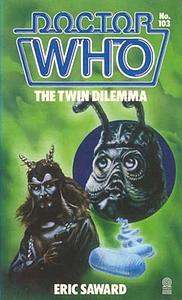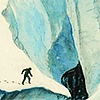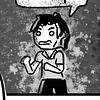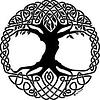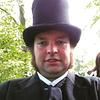Take a photo of a barcode or cover
eric saward you are not douglas adams and you need to accept it
Unlike a friend of mine who has seen the corresponding episodes and can weigh in on how much better this is, I, can only go off the target novel. It's a fine story at a 3.5 star rating but the Doctor felt a little off for me in this adventure. Maybe I just don't know 6 that well, or perhaps that's part of 6 figuring out who he is but it just excite me as much as other stories. That said generally I enjoyed it.
You can't polish a turd, but you can't blame Eric Saward for trying! The Twin Dilemma has been so maligned (perhaps a little unfairly - it's bad, but it's by no means the worst Classic Who had to offer) since it first aired that the Target novelisation, normally used to adapt a story and usually add some embellishment or tweak a few things, has become the published equivalent to a manuscript covered in pencil notes and liberal strikethrus. I knew to some extent that that'd be the case, it was what drove me to pick this to represent the Sixth Doctor in my little Target-reading project, but the extent to which Saward is constantly flustered by his past self is nigh unbelievable.
The opening of the book encapsulates this very well. The prologue to the story, wherein Romulus and Remus are kidnapped, is so heavily embellished that it might as well be an entirely new sequence. We are told of infidelity, hyperintelligent cats, and alcoholism, none of which particularly pertinent to the actual televised tale. The latter especially rears its head many times over in the story - Saward tells on himself in Freudian means by the fiftieth time he brings up fictional alcohol 'Voxnic'. Almost the entire cast either has drunk it or has desired to drink it - he had the sense at least to not promote child alcoholism THAT directly - by the end!
If you just want a Target novel that's different from the televised story, this is the finest choice of all. Sure, Exciting Adventure With The Daleks has funky early instalment weirdness and The Cave Monsters totally changes the story by the simple act of emphasising its support cast, but The Twin Dilemma is just wonderfully bizarre from beginning to end. Stories completely unrelated to the main one crop up and interrupt story beats (including the climax for some godforesaken reason), we spend half the story in characters brains learning more of what they thought than what happened, and Saward develops this weird compulsion to imitate fellow Who alumni Douglas Adams. The reading experience is hindered by only one thing - you still can't polish a turd.
The opening of the book encapsulates this very well. The prologue to the story, wherein Romulus and Remus are kidnapped, is so heavily embellished that it might as well be an entirely new sequence. We are told of infidelity, hyperintelligent cats, and alcoholism, none of which particularly pertinent to the actual televised tale. The latter especially rears its head many times over in the story - Saward tells on himself in Freudian means by the fiftieth time he brings up fictional alcohol 'Voxnic'. Almost the entire cast either has drunk it or has desired to drink it - he had the sense at least to not promote child alcoholism THAT directly - by the end!
If you just want a Target novel that's different from the televised story, this is the finest choice of all. Sure, Exciting Adventure With The Daleks has funky early instalment weirdness and The Cave Monsters totally changes the story by the simple act of emphasising its support cast, but The Twin Dilemma is just wonderfully bizarre from beginning to end. Stories completely unrelated to the main one crop up and interrupt story beats (including the climax for some godforesaken reason), we spend half the story in characters brains learning more of what they thought than what happened, and Saward develops this weird compulsion to imitate fellow Who alumni Douglas Adams. The reading experience is hindered by only one thing - you still can't polish a turd.
Unlike a friend of mine who has seen the corresponding episodes and can weigh in on how much better this is, I, can only go off the target novel. It's a fine story at a 3.5 star rating but the Doctor felt a little off for me in this adventure. Maybe I just don't know 6 that well, or perhaps that's part of 6 figuring out who he is but it just excite me as much as other stories. That said generally I enjoyed it.
What a weird doctor who story! I’d never read a classic era doctor who book and only seen old episodes from the 4th doctor so this was a bit of a departure. The Doctor is really wildin in this one. Cant say I love him. I thought the actual plot was fine haha. The most interesting part we’re the backstories of various characters rather the actual plot
There was one funny part where a character was like "I hate my kids I wish I could kill them" but mostly i 's just unentertaining excessive info about side characters.
http://nhw.livejournal.com/1065517.html#cutid1[return][return]It's not a big secret that the TV original of this is by far my least favourite Classic Who story. I am none the less utterly amazed by how much worse the novelisation is. Saward attempts to channel Douglas Adams by giving us lots of extra humorous background detail, but it doesn't work for two reasons: less importantly, because he does significant violence to continuity (especially in the back-story for Azmael) without putting anything more interesting in its place; but more crucially because he simply isn't very funny. The strangulated sentence structure and poor proof-reading ("gawdy" for "gaudy", "balk" for "bulk" and at one point "Meersham" for "Meerschaum") further detract from the presentation of what is an unattractive story to begin with. By the law of averages, there must be some turkeys among the various spin-off novels but I would be astonished if any were quite as bad as this. Doctor Who and the Visitation is so much better than this that I had difficulty believing that they were by the same author.
As other reviewers have noted, the novelisation has a very Douglas Adams feel to it. It's not just a depiction of the TV series, which in this case is a good thing.
